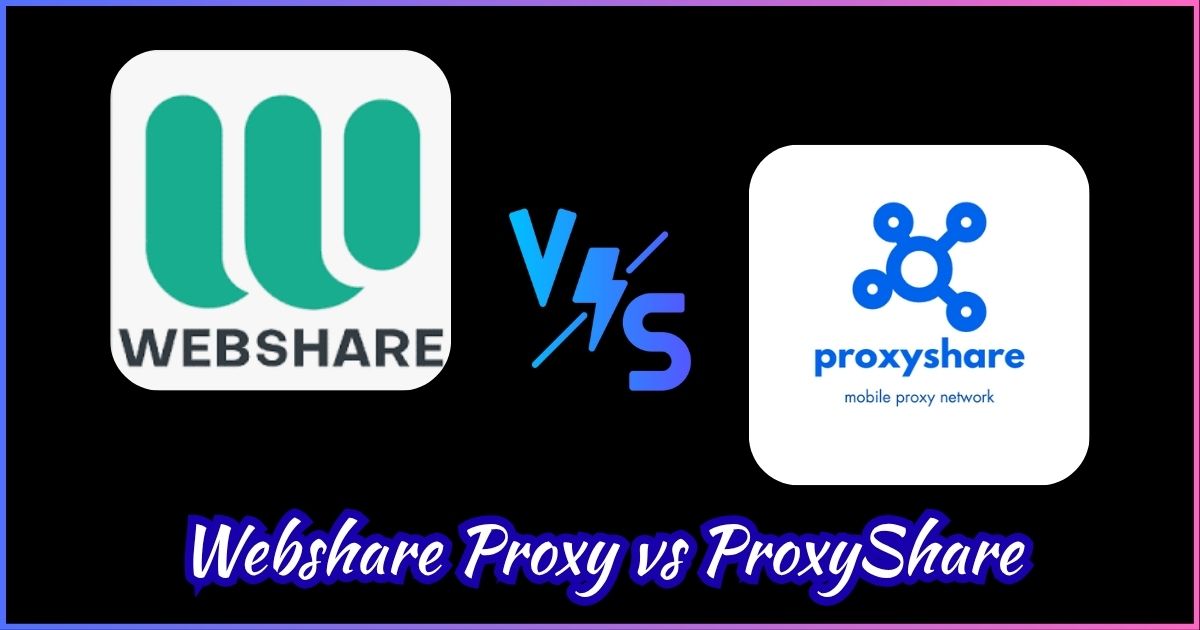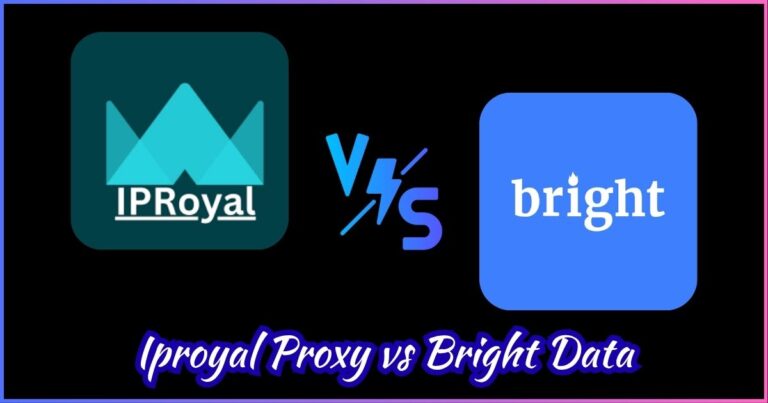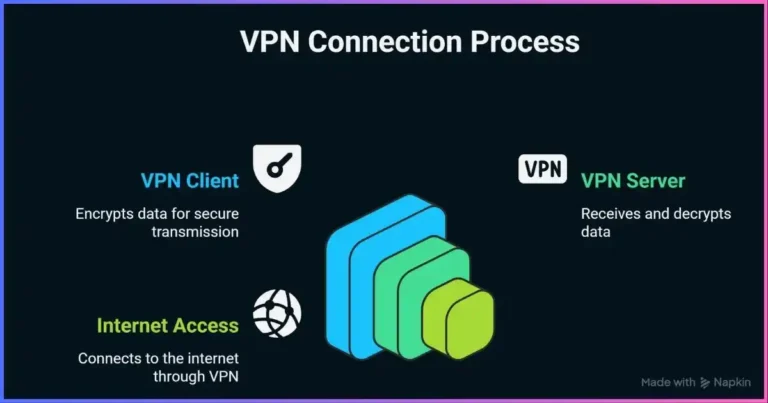Webshare Proxy vs ProxyShare: Comprehensive Comparison Guide
Choosing the right proxy service can significantly impact your online operations, whether you’re involved in web scraping, market research, or maintaining multiple accounts. This comprehensive guide compares two prominent proxy providers: Webshare Proxy and ProxyShare, analyzing their features, pricing, performance, and reliability to help you make an informed decision.
Both services offer residential and datacenter proxies, but they differ significantly in their approach, pricing models, and target audiences. This detailed comparison will examine every aspect of these services, backed by real performance data and market statistics.

Service Overview
The proxy service market has experienced tremendous growth, with the global proxy server market size reaching $4.29 billion in 2025 and projected to grow to $7.59 billion by 2035. Within this competitive landscape, Webshare Proxy and ProxyShare have emerged as significant players, each offering distinct advantages for different user segments.
Webshare Proxy, founded in 2018 and later acquired by Oxylabs, positions itself as an affordable, self-service proxy provider. The Silicon Valley-based company has built a reputation for offering freemium datacenter proxies with flexible subscription management and customizable features. With nearly 60,000 paying users and Fortune 500 companies among its clientele, Webshare has established itself as a reliable choice for entry and mid-level clients.
ProxyShare, on the other hand, markets itself as a provider of highly stable residential proxies with over 75 million IPs in its network. The service emphasizes reliability with a 99.9% uptime guarantee and focuses primarily on residential proxy solutions. ProxyShare targets users who prioritize stability and extensive geographical coverage for their proxy needs.
Pricing Comparison
Pricing strategies differ significantly between these two providers, reflecting their distinct market positioning and target audiences. Webshare follows a modular, subscription-based approach where users pay for specific features and bandwidth requirements, while ProxyShare offers more traditional pricing tiers based on proxy types and usage volumes.
Pricing Comparison Chart
| Service | Datacenter Proxies | Residential Proxies | ISP Proxies | Free Trial |
|---|---|---|---|---|
| Webshare | $1 for 10 IPs + 250GB | $7 for 1GB | $6 for 20 IPs + 250GB | 10 free proxies (500MB/month) |
| ProxyShare | $125 for 30 days | $5.5 per IP | $5.5 per IP | 500M free traffic trial |
Webshare’s pricing model stands out for its extreme affordability at the entry level, particularly for datacenter proxies where users can obtain 100 shared IPs for less than 3 cents each. However, the total cost increases significantly when users add bandwidth, threading, and premium features. This modular approach allows users to pay only for what they need but can become expensive for feature-rich configurations.
ProxyShare follows a more straightforward pricing structure with static residential proxies starting at $5.50 per IP and residential proxies priced competitively. The service offers substantial free trial traffic (500M) compared to Webshare’s 500MB monthly allocation, making it easier for users to evaluate the service before committing to a paid plan.
Ready to Test These Services?
Both providers offer free trials to help you evaluate their services before making a commitment.
Try Webshare Free Try ProxyShare FreeFeatures Analysis
The feature sets of these two services reveal their different philosophies and target markets. Webshare emphasizes customization and user control, while ProxyShare focuses on stability and ease of use.
Feature Comparison Matrix
| Feature | Webshare | ProxyShare |
|---|---|---|
| Protocols | HTTP, SOCKS5 | HTTP, SOCKS5 |
| Authentication | Username/Password, IP Whitelist | Username/Password, IP Whitelist |
| Rotation Options | Static, Per-request, Custom intervals | Static, Per-request, Sticky sessions |
| Geographic Targeting | 40+ countries (DC), 195 countries (Residential) | 195+ locations worldwide |
| Concurrent Connections | 500-1000+ (customizable) | Unlimited sessions |
| Bandwidth Limits | 250GB to unlimited | Plan-based limits |
| API Access | Yes | Yes |
| Dashboard | Advanced with real-time metrics | User-friendly interface |
Webshare’s strength lies in its highly customizable approach. Users can fine-tune rotation frequencies, bandwidth allocations, and even network priority settings. The platform offers unique features like Google-verified proxies and the ability to refresh individual IPs on demand. This granular control appeals to advanced users who need specific configurations for their use cases.
ProxyShare emphasizes simplicity and reliability. While it may not offer the same level of customization as Webshare, it provides essential features with a focus on stability. The service’s 99.9% uptime guarantee and unlimited concurrent sessions make it attractive for users who prioritize consistent performance over advanced configuration options.
Performance Benchmarks
Performance metrics are crucial when evaluating proxy services, as they directly impact the success of your operations. Based on independent testing and available data, here’s how these services compare across key performance indicators.
Performance Comparison
Webshare Performance Highlights
Recent testing of Webshare’s services revealed impressive infrastructure performance with a 99.93% success rate for datacenter proxies and an average response time of 0.67 seconds. The residential proxy network demonstrated excellent reliability with over 850,000 unique IPs encountered during testing, with 96% classified as residential addresses.
Webshare’s datacenter proxies showed strong performance metrics during independent testing. The service achieved a 99.93% success rate with an average response time of 0.67 seconds when tested against a global CDN. Download speeds averaged 21.18 MB/s, though individual IP performance varied significantly, with some IPs performing considerably slower than others.
For residential proxies, Webshare demonstrated exceptional pool size and quality. Testing revealed access to over 850,000 unique IPs globally, with 96% correctly classified as residential addresses. The service showed particularly strong performance in major markets like the US (251,456 unique IPs) and Europe (370,948 unique IPs).
ProxyShare’s performance data, while less extensively documented in independent testing, shows consistent uptime metrics of 99.9% across their network. The service emphasizes stability over raw speed, positioning itself as a reliable choice for long-term operations that require consistent connectivity.
| Metric | Webshare | ProxyShare |
|---|---|---|
| Datacenter Success Rate | 99.93% | Data not available |
| Average Response Time | 0.67s (DC), 1.67s (Residential) | Data not available |
| Uptime Guarantee | 99.97% | 99.9% |
| Pool Size (Residential) | 80M+ IPs | 75M+ IPs |
| Download Speed | 21.18 MB/s average | Data not available |
Proxy Types Available
Both services offer multiple proxy types, but their approaches and specializations differ significantly. Understanding these differences is crucial for selecting the right service for your specific needs.
Proxy Type Distribution
Webshare Proxy Types
Webshare offers a comprehensive range of proxy types, making it a versatile choice for various use cases. The service provides datacenter proxies in four variants: shared, private, dedicated, and verified. This tiered approach allows users to choose based on their performance requirements and budget constraints.
The service’s residential proxy network spans 195 countries with over 80 million IPs, offering both rotating and sticky session options. Webshare’s ISP proxies, while geographically limited primarily to the US, provide an excellent balance between datacenter performance and residential authenticity.
ProxyShare Proxy Types
ProxyShare focuses heavily on residential proxies, offering both static and rotating options. The service provides access to over 75 million residential IPs across 195+ locations worldwide. Their static residential proxies are particularly noteworthy, offering ISP-level performance with residential IP authenticity.
The service also offers datacenter proxies and has been expanding its ISP proxy offerings. ProxyShare’s approach emphasizes quality and stability over variety, focusing on delivering consistent performance across their core offerings.
Need Help Choosing the Right Proxy Type?
Different proxy types serve different purposes. Contact the providers directly for personalized recommendations.
Contact Webshare Contact ProxyShareMarket Statistics and Industry Position
The proxy service industry has experienced significant growth, driven by increasing demand for web scraping, market research, and privacy protection. Understanding market dynamics helps contextualize where these services fit within the broader landscape.
Proxy Market Growth Projection
The global proxy server market is experiencing robust growth, with the market size valued at $4.29 billion in 2025 and projected to reach $7.59 billion by 2035, representing a compound annual growth rate (CAGR) of 7.03%. This growth is driven by increasing cybersecurity concerns, the need for anonymous browsing, and the expansion of web scraping activities across various industries.
Within this market, residential proxies represent the fastest-growing segment, with businesses increasingly recognizing their value for legitimate web scraping and market research activities. The demand for high-quality, ethically-sourced residential IPs has led to premium pricing in this segment, explaining why providers like ProxyShare can command higher prices for their residential offerings.
Webshare’s position as an affordable alternative has allowed it to capture significant market share among small to medium-sized businesses and individual developers. The company’s freemium model has been particularly effective in attracting new users to the proxy ecosystem, with many eventually upgrading to paid plans as their needs grow.
Pros and Cons Analysis
Every proxy service has strengths and weaknesses. Here’s an honest assessment of both Webshare and ProxyShare to help you make an informed decision based on your specific requirements.
Webshare Advantages
- Extremely affordable entry-level pricing
- Highly customizable subscription options
- Freemium model with genuine free tier
- Advanced dashboard with real-time metrics
- Multiple proxy types available
- Google-verified proxy options
- Flexible rotation and refresh options
- Strong performance benchmarks
Webshare Limitations
- Complex pricing structure can be confusing
- Email-only customer support
- Limited ISP proxy locations
- Costs escalate with additional features
- Performance varies significantly between IPs
- Newer company with less market presence
ProxyShare Advantages
- Excellent uptime guarantee (99.9%)
- Large residential IP pool (75M+)
- Generous free trial (500M traffic)
- Simple, straightforward pricing
- Focus on stability and reliability
- Unlimited concurrent sessions
- Wide geographic coverage
- User-friendly dashboard
ProxyShare Limitations
- Higher pricing compared to competitors
- Limited customization options
- Less comprehensive proxy type selection
- Fewer advanced features
- Limited performance benchmarking data
- Less transparent about infrastructure
Related: Bright Data Proxy vs ProxyShare
Related: Webshare Proxy vs Bright Data Proxy
Best Use Cases
Choosing between Webshare and ProxyShare largely depends on your specific use case, budget, and technical requirements. Here’s a breakdown of scenarios where each service excels.
Webshare is Best For:
Webshare excels in scenarios where cost-effectiveness and customization are priorities. The service is particularly well-suited for developers and small businesses who need flexible proxy solutions without breaking the budget. Its freemium model makes it an excellent choice for testing and development purposes.
- Small to medium-scale web scraping projects
- Development and testing environments
- Budget-conscious users seeking affordable solutions
- Projects requiring specific customization options
- Users who want to start free and scale gradually
- Multi-account management on a budget
- SEO monitoring and research
ProxyShare is Best For:
ProxyShare shines in enterprise and professional environments where reliability and stability are paramount. The service is ideal for users who prioritize consistent performance over cost savings and need dependable residential IP access for critical operations.
- Enterprise-level web scraping operations
- Mission-critical applications requiring high uptime
- Large-scale market research projects
- Ad verification and brand protection
- Price monitoring and competitor analysis
- Social media management at scale
- E-commerce and retail intelligence
Ready to Make Your Choice?
Both services offer trial options to help you evaluate their suitability for your specific needs.
View Webshare Plans View ProxyShare PlansFinal Verdict: Webshare Proxy vs ProxyShare
The choice between Webshare Proxy and ProxyShare ultimately depends on your specific needs, budget constraints, and technical requirements. Both services offer unique advantages that cater to different segments of the proxy market.
Webshare Proxy emerges as the clear winner for cost-conscious users and those who value customization. Its freemium model, affordable pricing, and extensive configuration options make it an excellent choice for developers, small businesses, and anyone looking to get started with proxy services without a significant upfront investment. The service’s performance benchmarks are impressive, and its modular pricing approach allows users to pay only for what they need.
ProxyShare, on the other hand, excels in providing reliable, stable proxy services for users who prioritize consistency over cost savings. Its 99.9% uptime guarantee, large residential IP pool, and straightforward pricing make it suitable for enterprise applications and critical operations where reliability is paramount.
Quick Decision Guide
Choose Webshare if: You’re budget-conscious, need customization options, want to start with a free tier, or require advanced features like Google-verified proxies.
Choose ProxyShare if: You prioritize reliability and uptime, need a large residential IP pool, prefer simple pricing, or run mission-critical operations.
The proxy service market continues to evolve rapidly, with both providers likely to introduce new features and pricing models in response to user feedback and market demands. Regardless of your choice, both Webshare and ProxyShare offer legitimate, professional proxy services that can support various online operations effectively.
For most users, we recommend starting with Webshare’s free tier to evaluate the service’s suitability for your needs. If you require guaranteed uptime and are willing to pay premium prices for stability, ProxyShare’s residential proxy offerings provide excellent value for enterprise-level applications.
Start Your Proxy Journey Today
Don’t let analysis paralysis hold you back. Both services offer risk-free trials to help you make the right choice.
Get Started with Webshare Get Started with ProxyShareDisclosure: We may earn commission for purchases that are made by visitors on this site at no additional cost on your end. All information is for educational purposes and is not intended for financial advice. Read our affiliate disclosure.






